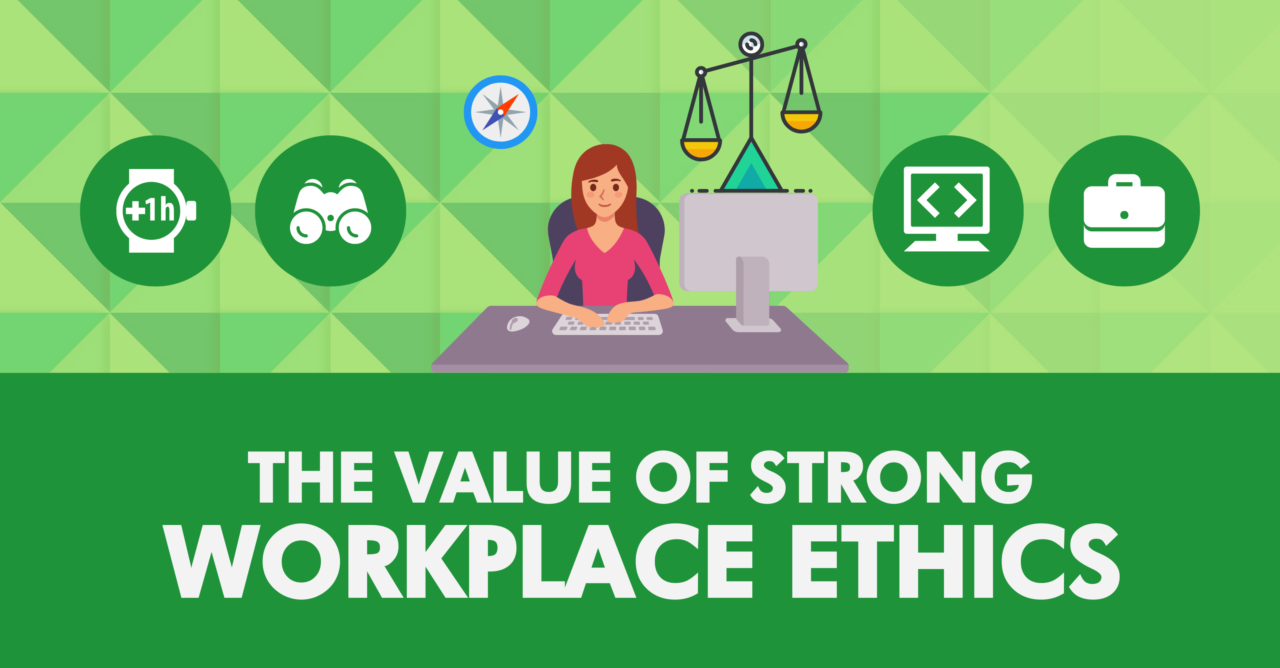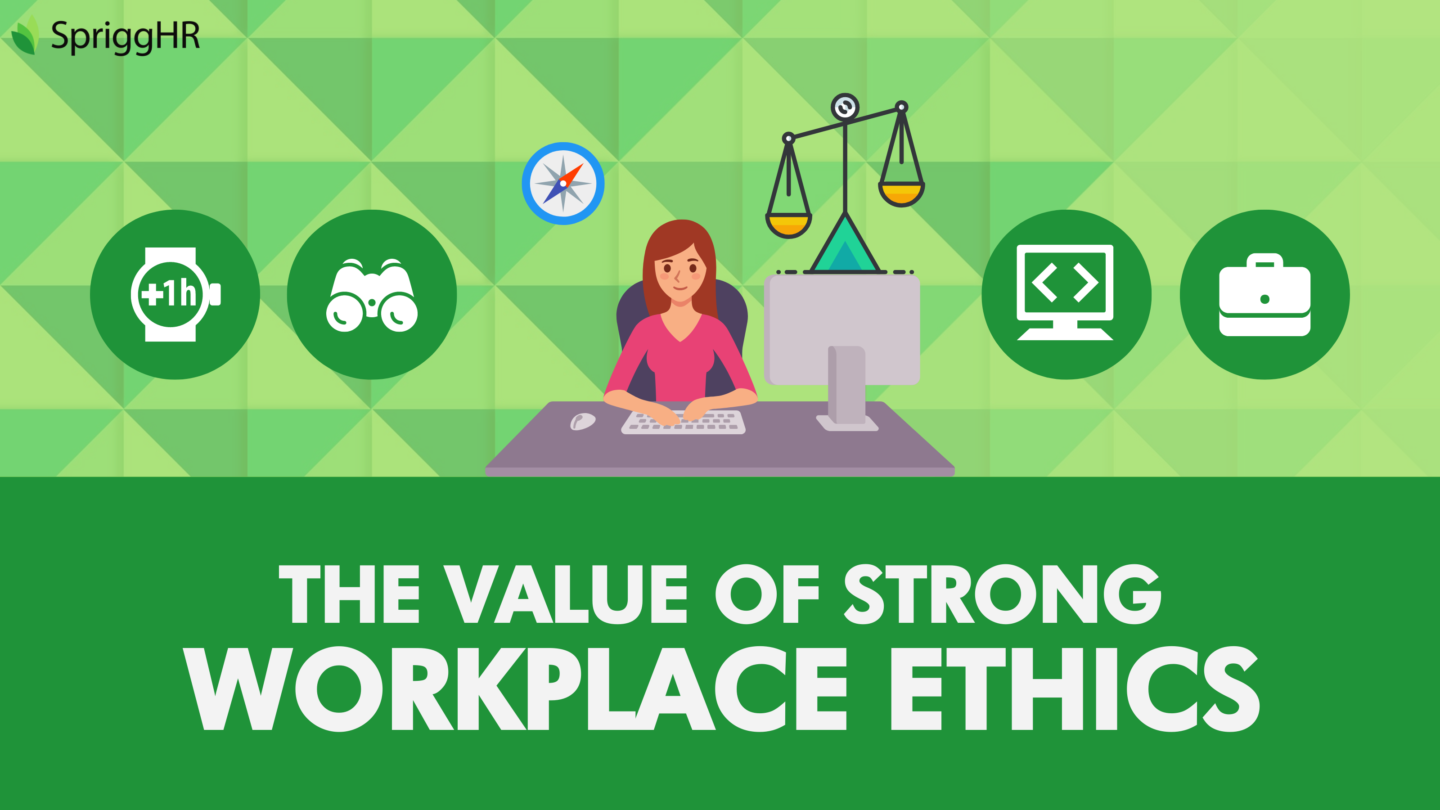
The Value of Strong Workplace Ethics
Workplace ethics refers to the way employees in an organization govern themselves and their overall work attitude, but it can also refer to the morality, or lack thereof, permeating a workplace.
The way a company operates and is perceived by both the public and competitors often comes down to the workplace ethics. A truly ethical workplace should model ethical behavior from the top down, and from the inside out. Workplace ethics are reflected in how organizations treat their suppliers and customers, how they interact with others, how they perform their tasks, and how they communicate both internally and externally.
In a hurry? Take the white paper to go!

Strong Workplace Ethics
Send download link to:
What are Workplace Ethics?
Workplace ethics, also referred to as business ethics, describes the ethical dimensions of organizations and company activities. The term encompasses nearly every issue that may arise in a business, including production, distribution, marketing, sale, and consumption of the goods and services being offered.
In a 2018 survey of ethics in the U.S. workplace conducted by the Ethics & Compliance Institute (ECI), 47% of respondents had personally observed conduct that violated either the law or organizational ethics standards. When discussing workplace ethics, a good way to understand its detriments involves looking at the ways in which businesses have displayed and promoted negative behaviors in the past. In the Global Business Ethics Survey of 2019, misconduct was shown to manifest in several different negative ways. Some of the findings included can be viewed here.
For a deeper understanding of the common ethical issues in business that could harm an organization’s success, check out 6 Ethical Issues in Business and What to Do About Them.
At its core, workplace ethics boils down to moral philosophy. It is framed by how an individual or company’s morality influences the decisions made and the behaviors exhibited. It is important to recognize the distinction between what is law and what is ethical. It is possible for a behavior to technically be legal, while still being considered unethical.
The Role of Workplace Ethics
Ethical lapses of any kind have the tendency to snowball in a work environment. Once employees see others breaking the rules without repercussions, they may start to think it’s excusable for them to do so as well. It sends the message that not only will the behavior go unaddressed, it communicates that it’s acceptable. Worse case, they may view the company in a negative light and choose to leave. Essentially, a culture where misconduct is tolerated could result in higher turnover, lower productivity, and ultimately, a diminished reputation and profitability.
An organization that does not consistently combat unethical behaviors will always suffer, even if the wrongdoings in question aren’t considered to be major by most people’s judgment. Unethical behavior that goes on without being reprimanded undermines the moral fabric of an organization, leading to larger problems than the unethical issue in question.
Workplace Ethics in Action
Workplace ethics can be divided into two larger areas of effort: how an employee governs themselves within the workplace, and how the organization conducts itself both internally and externally (how ethics are at play in the corporate culture). Both have a tremendous effect on employee morale, performance, loyalty, job turnover, and work ethic itself.
The Role of Work Ethic
Managerial style can work to improve an employee’s work ethic by establishing systems and habits for accomplishing tasks efficiently and interacting effectively in the workplace. By inspiring and even rewarding ethical behavior in the individual efforts of employees, an organization can ensure that ethical conduct permeates all levels of the organization and reaches the public’s perception of the company.
The 8 central characteristics of strong employee work ethic are:
- Punctuality: completing projects when due, showing up on time, following break-time protocol, and informing supervisors of challenges in a timely manner are all efforts that respect the value of time in the workplace.
- Accountability: employees and employers alike should be held accountable in their work efforts, meaning they shoulder the responsibility for ongoing projects and take the blame for errors when necessary.
- Focus: in order to efficiently accomplish a task, an employee must remain focused and avoid the distractions of chatter, social media, technology, etc.
- Initiative: this is when an employee does something productive or useful to the company without being asked. Strong employees care not about ticking off items on a to-do list but doing what needs to be done for the betterment of the organization. Showing initiative in work efforts indicates to management that an employee values success.
- Productivity: productivity hinges upon an employee’s ability to overcome distractions, ignore external influences, and conquering obstacles that inhibit them from performing their task.
- Professionalism: being present in their work culture, employees who exhibit professionalism show up and take their work seriously, staying respectful of others and dressing appropriately.
- Dedication: dedication means consistency and showing up ready to accomplish tasks daily, all while maintaining focus and productivity.
- Desire to Improve: employees who embrace feedback and learning moments show that they are willing to work to grow in their careers.

Workplace Ethics: Examples
Beyond the individual’s efforts to conduct themselves ethically in their work, there is a larger sphere of how workplace ethics exist in the corporate culture as a whole and how the organization conducts itself both internally and externally.
Companies should always have an employee code of conduct available, so all members of an organization can have a clear understanding on where the company stands on different ethical matters. If some unethical behaviors to some may seem harmless and go unaddressed, it will speak a lot to both the individual’s character and the tolerance of misconduct by the organization.
Some of the most common examples of workplace ethical lapses fall under the following categories:
- Preferential Treatment. Employees who receive special treatment at work, whether from patronage, friendship, or sexual and/or romantic relationships, are privy to unfair and unethical favoritism, which should be reported by fellow employees.
- Gossiping. Spreading untrue rumors about colleagues, company projects and plans, or anything else related to work culture is both unethical and indicative that an employee cannot be trusted when it comes to discretion and privacy.
- Dishonesty. This can manifest in several different ways, though common ones include taking credit for other people’s work or misleading information about progress on a project. Dishonesty comes in many different forms and is another trait that can derail an employee’s career no matter how small or harmless it may seem in the moment.
- Selfishness. Thinking only of your own interests, even in seemingly insignificant situations such as hoarding office supplies, leaving dishes unwashed in the kitchen, not remaking coffee or refilling the printer paper, is not a behavior conducive to cooperation, and is likely to be considered inconsiderate or even unethical by coworkers.
Corporate Ethics
On a larger scale, companies are always on the look-out for ethical dilemmas. This involves rigid monitoring of environmental practices, payroll choices, political wrangling, hiring processes and policies, revenue reporting, and so on. Companies should have a broad ethical stance in both how they project themselves to the outside world, and how they operate internally.
In the same Global Business Ethics Survey of 2019 as referenced above, the following findings regarding building an ethical corporate culture were revealed:
- Organizations with “strong” or “strong-leaning” ethics cultures increased to 66%.
- Organizations providing ethics training rose to 81%.
- 67% of organizations included ethical conduct as a performance measure in employee evaluations.
- 74% of organizations communicated internally about disciplinary actions when wrongdoings occurred.
Companies that work on building and maintaining ethical workplace cultures are more likely to be financially successful, as well as having more motivated and productive employees.
The Value of Strong Workplace Ethics
Ethics are the guiding principles that determine how employees conduct themselves in the workplace. While ethics and workplace behavior have always been at the forefront of organizational efforts, there are still issues that occur today regarding ethical lapses in corporate conduct and judgment.
Starting internally by promoting honest, hardworking employees in a workplace culture driven by productivity and a strong work ethic, employees are likely to use those driving principles of decency and fairness to increase overall company morale, ultimately improving an organization’s reputation and ensuring long-term success. Understanding the elements and challenges of workplace ethics and behavior can help companies to create harmonious working environments for their employees.
Take the white paper to go!
Strong Workplace Ethics
Send download link to:




